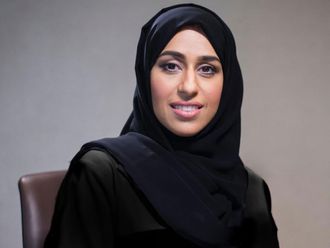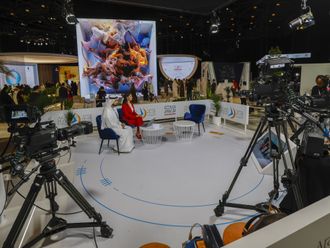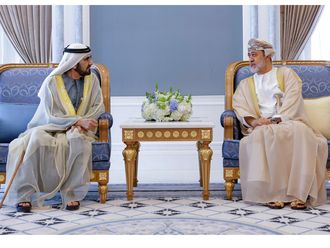Brussels: The United Arab Emirates (UAE) participated in the 4th meeting of the Arab League permanent representatives and their counterparts at the European Union’s Political and Security Committee (PSC) which the Belgian capital hosted on Wednesday to discuss the Euro-Arab political and strategic dialogue.
The UAE Ambassador to Egypt and Permanent Representative to the Arab League, Mohammad Bin Nakhira Al Dhaheri, who chaired both the UAE and Arab League delegations to the meeting, said the launch of the first Euro-Arab strategic dialogue would bring the two sides even closer and deliver broader joint co-operation at the higher levels in areas of mutual interest.
Al Dhaheri, on behalf of the UAE and Arab Group, extended heartfelt condolences to the leadership, government and people of the Republic of France and all peoples of Europe for the victims of the multiple terrorist attacks which took place in Paris recently and left scores of innocent people dead and injured. He wished a speedy recovery to those injured.
He reiterated the strong condemnation of the Arab Group to the series of attacks which took place in Beirut, Paris and Mali and its complete standing and solidarity with these countries at these delicate times so as to confront these heinous crimes.
He also reiterated the unwavering support of the Group for efforts by the international community to counter terrorism and extremism which know no religion nor country, calling the international family to step up joint efforts to confront this menace.
Acknowledging the importance of longstanding, deep ties of friendship, co-operation and strategic partnerships between the Arab and European countries, Al Dhaheri said the dialogue would contribute to efforts aimed at closing ranks, advancing joint work in regards to common visions and stances towards matters that concern the two groups regionally and internationally.
“It is no secret that Arab and Islamic countries have suffered more than any other countries from terrorism and terrorist organisations which have an agenda that is far away from serving national interests. These organisations have committed the most brutal crimes and attacks against places of worship - mosques, churches and temples - to undermine security and stability in these countries,” he said.
He indicated that Arab countries had early sensed this threat and signed the first of its kind counter-terrorism convention in 1998 to strengthen political and security co-operation to fight terrorism and dry up its sources.
“There is a need for accelerating effective measures to eradicate the threat through joint work to promote moderate and tolerant religious discourse that tackles the root causes of terrorism and extremism and stands up to fanatic, extremist and sectarian ideologies, leverage the media message to spread values of moderation and tolerance, introduce preventive measures by blocking social websites that preach and incite extremist thought and terrorist acts.”
He noted that the UAE has taken a firm position against terrorism by introducing laws and legislations that criminalise acts leading to terrorism. The UAE has issued a law against any form of discrimination and hatred on the basis of religion, caste, creed, doctrine, race, colour or ethnic origin.
Furthermore, the UAE had established Hedaya, the first-ever international Centre dedicated to countering violent extremism, and Sawab, a joint initiative by the governments of the United Arab Emirates and the United States in support of the Global Coalition against DAESH, he added.
Sawab will use online communication and social media tools to put things in perspective and amplify those many moderate voices that too often get drowned out by the noise of the extremists. It also established the Muslim Council of Elders, the first independent international body that aims at promoting peace in Muslim Societies. He also referred to the role of similar centres launched in Saudi Arabia and Vienna.
On the Palestinian Cause, the Permanent Representative to the Arab League said the issue will remain the main, attractive factor for the forces of terrorism and extremism in the region if no just solution was reached. Furthermore, it will also hold the key to security and stability in the region and remain the source of all tensions.
‘’Failure to find a solution to the Palestinian Cause by establishing the independent, sovereign state of Palestine on the border line of 4th June, 1967 with East Jerusalem as its capital in accordance with the international legitimacy resolutions and the Arab Peace Initiative means the Cause will continue to be a key factor for instability in the region,’’ he warned.
He attributed the acts of violence the region is witnessing to the feelings of frustration, injustice and despair inflicted upon the Palestinian people. Israel’s continuous occupation by force and its repeated aggressions on the Al Aqsa Mosque dash all hopes for a just settlement to the Cause and contravene international relevant resolutions.
With regards to the UAE’s three islands of Greater and Lesser Tunbs and Abu Musa, occupied by Iran, Al Dhaheri said, ‘’The UAE, through this platform, once again calls on the Islamic Republic of Iran to respond to the UAE’s initiatives to find a just and peaceful settlement to the issues either through direct bilateral negotiations or recourse the case to the International Court of Justice.’’
He called on the Iranian government to positively respond to this internationally-backed Arab demand for the sake of building confidence and enhancing security and stability in the region.
Turning to Syria, he said the ongoing and escalating developments prove again the urgency of reaching a political solution to the crisis in accordance with Geneva Conference Declaration (1) which fulfils aspirations of all segments and components of the Syrian people. He also stressed the importance of co-ordinating Arab and international efforts in this respect and of handling the deteriorating humanitarian situation, calling on the United Nations Security Council to shoulder its responsibility in enforcing its relevant resolutions.
On the Syrian refugee crisis, Al Dhaheri welcomed measures taken by some European states to host a number of Syrian refugees. He also commended efforts by neighbouring and other Arab countries to welcome an increasing number of refugees following the situation that has evolved into the world’s largest humanitarian crisis.
Regarding Yemen, the UAE official said the solution should be based on clear references for restoring legitimacy in line with the GCC Initiative and its implementing mechanisms, the agreement for peace and partnership and outcomes of the national dialogue as well as resolutions issued by the Arab League and UN Security Council, particularly resolution No. 2216.
“Every effort should be made to back Yemen’s efforts towards stability and counter-terrorism so that Yemen can end conflict and chaos and restore security and stability,” he said.
On Libya, he emphasised the support of the Arab Group to the political solution in Libya to preserve its unity and avert disintegration and division.
“A legitimate government should be supported to confront criminal, terrorist gangs that target Libya and its capabilities and threaten security and safety of neighbouring countries - Arab countries or European ones in the north Mediterranean,” he added.











